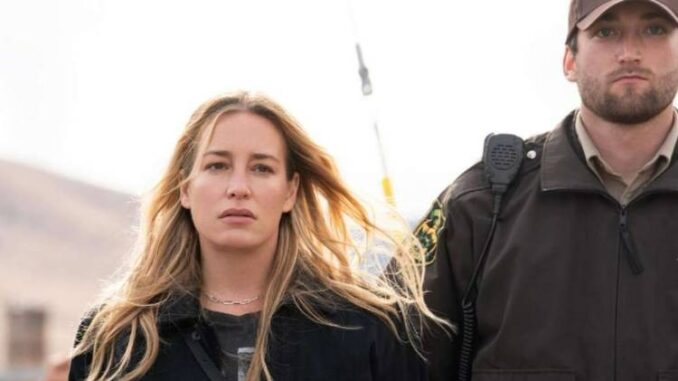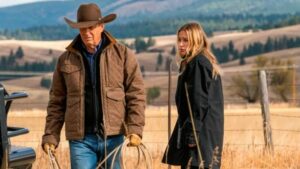
The character of Summer Higgins in the television series “Yellowstone” has been a polarizing figure among fans and critics alike. Introduced as an environmental activist who clashes with the Dutton family, Summer’s storyline has often felt out of sync with the broader themes and arcs of the show. While “Yellowstone” is celebrated for its intense family drama and complex exploration of power, land, and legacy, the inclusion of Summer has raised questions about how well the character fits into this intricate tapestry.

From her first appearance, Summer Higgins’ role seemed designed to provide a counterpoint to the Dutton family’s ruthless defense of their ranch and way of life. As an outspoken activist, she represents values and perspectives that starkly contrast with the Duttons’ ethos. However, the execution of her character arc has often been inconsistent, leaving viewers uncertain about her purpose within the narrative.
One of the primary issues with Summer’s storyline is the lack of depth and nuance given to her character. In a series known for its morally ambiguous characters and layered storytelling, Summer has often come across as one-dimensional. Her activism, while a potentially rich source of conflict, is rarely explored in a meaningful way. Instead, it frequently serves as a superficial plot device to create tension or advance other characters’ arcs. This lack of development makes it difficult for viewers to fully invest in her journey or understand her motivations beyond her initial ideological stance.
Additionally, Summer’s interactions with the Dutton family have often felt forced or contrived. Her relationship with John Dutton, in particular, has been a source of contention. While their dynamic could have provided an interesting exploration of opposing worldviews and the possibility of mutual understanding, it has largely been reduced to a series of awkward encounters and half-hearted attempts at romantic tension. This underdeveloped relationship further underscores the show’s struggle to integrate Summer into its broader narrative.

Another challenge with Summer’s character is the way she contrasts with the rest of the ensemble cast. “Yellowstone” is populated with characters who are deeply flawed yet compelling, each grappling with their own inner demons and external challenges. In comparison, Summer often feels like a caricature of an activist rather than a fully realized person. Her presence highlights a missed opportunity to delve into the complexities of environmentalism and its intersection with the themes of land ownership and conservation that are central to the show.
Moreover, the show’s treatment of Summer raises broader questions about how “Yellowstone” handles characters who exist outside the immediate sphere of the Dutton family. While characters like Rip Wheeler, Beth Dutton, and Kayce Dutton are given ample screen time to develop their backstories and motivations, Summer’s role remains peripheral. This disparity reinforces the perception that she is an outsider, not only within the world of the Dutton ranch but also within the narrative structure of the show itself.
Despite these shortcomings, Summer’s presence does serve some narrative purposes. Her clashes with the Duttons provide moments of ideological tension that challenge the family’s worldview. These moments, while fleeting, hint at the potential for more substantive storytelling. For instance, Summer’s activism could have been used to explore the environmental impact of ranching or the ethical dilemmas faced by landowners. However, these opportunities are often sidelined in favor of more conventional plotlines centered on power struggles and familial loyalty.
The underutilization of Summer Higgins reflects a broader trend in “Yellowstone” of introducing characters with intriguing potential but failing to fully capitalize on their narrative possibilities. This pattern is particularly noticeable with characters who are positioned as outsiders or antagonists to the Dutton family. While these characters often serve as catalysts for conflict, they are rarely given the same depth or complexity as the core cast. As a result, their stories often feel incomplete or unsatisfying.
In the case of Summer, her character arc highlights the challenges of balancing individual storylines within an ensemble cast. With so many characters and plotlines vying for attention, it can be difficult to give each one the attention it deserves. However, this does not excuse the lack of effort in developing Summer into a more compelling and multidimensional character. Her presence on the show could have been an opportunity to broaden the narrative scope and engage with new themes, but this potential remains largely unrealized.
Ultimately, Summer Higgins’ journey on “Yellowstone” is a testament to the complexities of crafting a sprawling, character-driven drama. While the show excels in many areas, its handling of certain characters, including Summer, reveals some of its narrative limitations. For fans who have come to expect intricate storytelling and richly drawn characters, her underwhelming arc is a disappointment. As “Yellowstone” continues to evolve, it remains to be seen whether the series will find a way to better integrate characters like Summer into its broader narrative or if they will remain as missed opportunities in an otherwise compelling saga.
